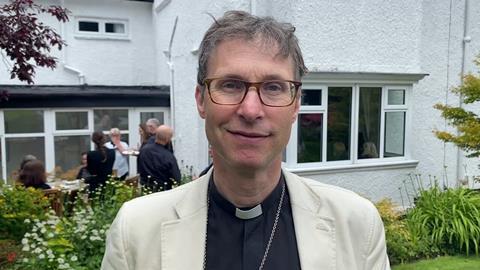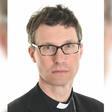As division over immigration and social cohesion grows, Bishop Philip North says Christians should reject the temptation to take sides, and instead choose the path of prayer and reconciliation

When Joshua was near Jericho, he looked up and saw a man standing before him with a drawn sword in his hand.
Joshua went to him and said to him, “Are you one of us, or one of our adversaries?” He replied, “Neither; but as commander of the army of the LORD I have now come.”(Joshua 5:13-14).
Whose side are you on? That question seems to be one that confronts all of us right now.
A polarised people
We meet against a backdrop of serious threats to national unity and social cohesion. One of our priests described to me a few days ago how his community has become a “town of two flags” with one half festooned with the flag of St George, the other with the flag of Palestine.
We have seen huge marches for Palestine or against immigration. We are seeing growing anger with politicians and the political establishment and the accelerated rise of populism. So many people seemed to be locked into a mood of anger. Then, three weeks ago, two people were killed in a terrorist-inspired attack on a synagogue in Manchester.
Against such a backdrop, a world that understands only binaries demands that we take sides. But of course, for us as Anglicans, such binary choices are incredibly difficult to take. We are on the ground in every community so we hear and try to understand every voice.
We understand the desperate fear of asylum seekers driven from home, often for professing Jesus as Lord, and we want to offer a safe place.
But we also understand the frustration of white working-class communities who have seen change imposed on neighbourhoods they no longer recognise and who have endured years of an ‘austerity economy’ which means work no longer pays.
The binaries don’t work for those who have the cure of souls for every single person in their community. And that failure to take sides can make us sound and feel weak.
“Where is the voice of the Church of England?” people are asking. And it’s a good question. The refusal to take one side can lead to us being misunderstood or vilified on the assumption we stand for the other. Such a countercultural stance can be an uncomfortable place, a confusing and complex place, sometimes an isolating place.
Joshua was a binary thinker. In the above passage he met a strange warrior near to the city of Jericho and he asked, “Are you one of us or one of our adversaries?” Or in other words, whose side are you on? But this man was not playing that game. “Neither; but as commander of the army of the LORD I have now come.” I’m not on your side. I’m not on your adversaries’ side. I’m on the Lord’s side.
It is intriguingly unclear who this warrior is. Jewish tradition has seen in him the Archangel Michael. Christian authors have identified him as the pre-incarnate Christ. Whatever the answer, today his words should be our words. Are you one of us or one of our adversaries? Neither. We are on the Lord’s side. That’s not weak. That’s distinctive Christian living.
Pray, reconcile and declare Jesus
We are on the Lord’s side. So we pray. It’s always tempting to leap straight into words or actions, but we must never forget that by far the most important contribution we make to the communities we serve is to pray for them. Pray for everyone, including those who are putting up flags or going on marches. Pray for everyone, especially those with whom you don’t personally agree. And in your prayers, don’t forget to ask. Ask for the Lord to intervene to bring healing, reconciliation and peace. Ask for the Lord to turn hatred into love and anger into joy.
We are on the Lord’s side. So we reconcile. In a binary world, Jesus mixed with everyone: with Jew and Samaritan, with Pharisee and Sadducee, with Israelite and Roman.
One of the great gifts we can offer is to listen to all sides and so help one side to understand another. Bishop Arun Arora is doing just that in Leeds by meeting with the local leader of the far right. And I have heard of some of you chatting to those protesting outside asylum seeker hotels or meeting up with the leaders of different faith groups. In these encounters, the fruit of the conversation is the fact of conversation. Don’t expect big results. What matters is the talking.
We are on the Lord’s side. So we condemn hatred and violence. Jesus showed a different way of being alive, not the way of vengeance and hatred but the path of self-giving love. In his name we must stand firm in condemning racism, hatred and violence. For we know that every single person made by the Lord is beautiful and beloved. If we cannot make a stand for the dignity of the human person: Christian, Muslim, Jew, asylum seeker, flag painter and so on, then we really do have nothing to say.
I’m not on your side. I’m not on your adversaries’ side. I’m on the Lord’s side.
We are on the Lord’s side. So we declare Jesus. The evidence is increasingly clear that in a time of fracture in the world, people are looking to the Church for answers to their questions. And what they want is clear, definite and distinctive answers. The cross being carried in procession at far right rallies is a clear warning that if we do not step in to fill the vacuum, others with other agendas will.
Our shared calling
The signs of the times are clear. Our local churches must be ready for the renewal for which we pray. Ready to welcome, ready to teach, ready to call to repentance and conversion, ready to change lives with the gospel.
It was bold of Bishop Sarah Mullally to address exactly these complex issues of social cohesion and the response of the church when it was announced that she is to be the next Archbishop of Canterbury. She brings with her a strong track record as a reconciler and a pastor and our prayer for her must be that she can inspire the church into a new age of confident evangelism.
For we don’t need to make binary choices. We have another way. The Lord’s way. We are on his side. We are his joyful followers.
Bishop Philip North was speaking at a recent Diocesan Synod meeting in Blackburn. His remarks have been re-used with permission



































1 Reader's comment